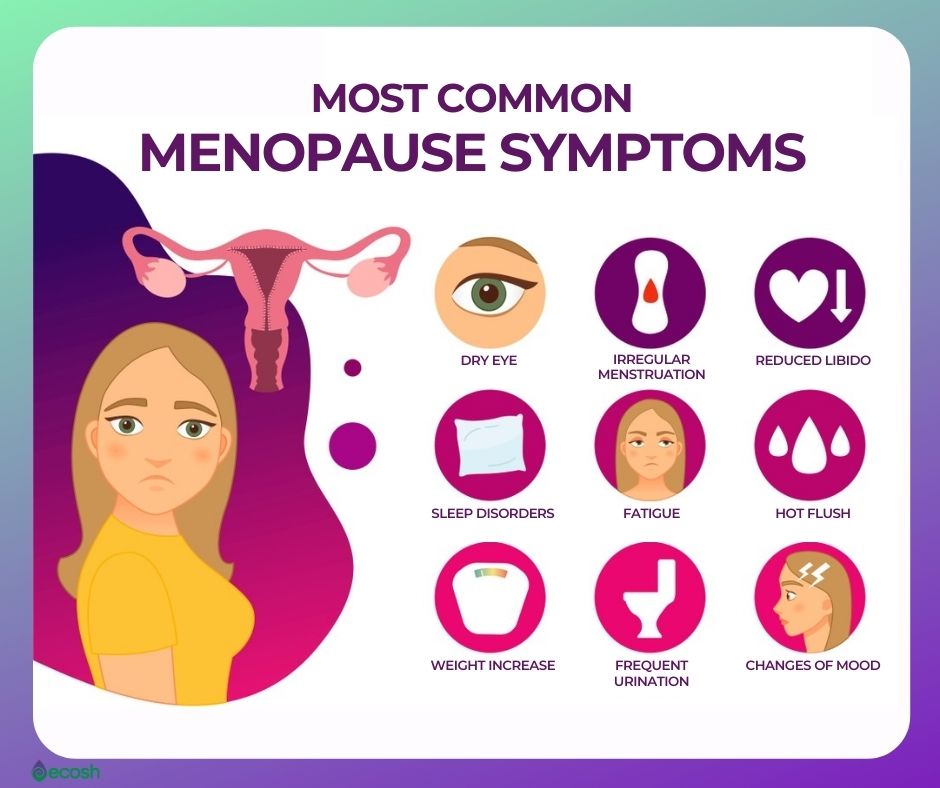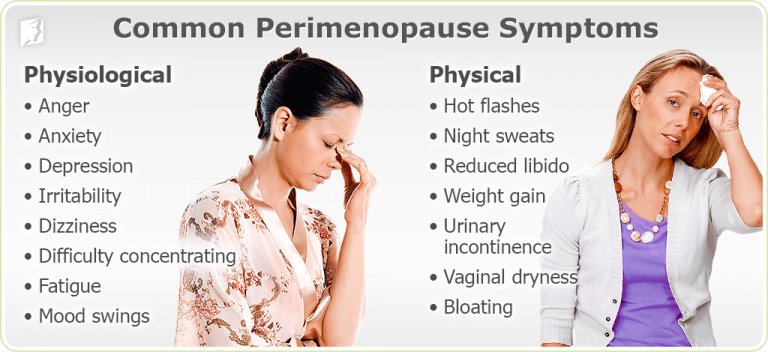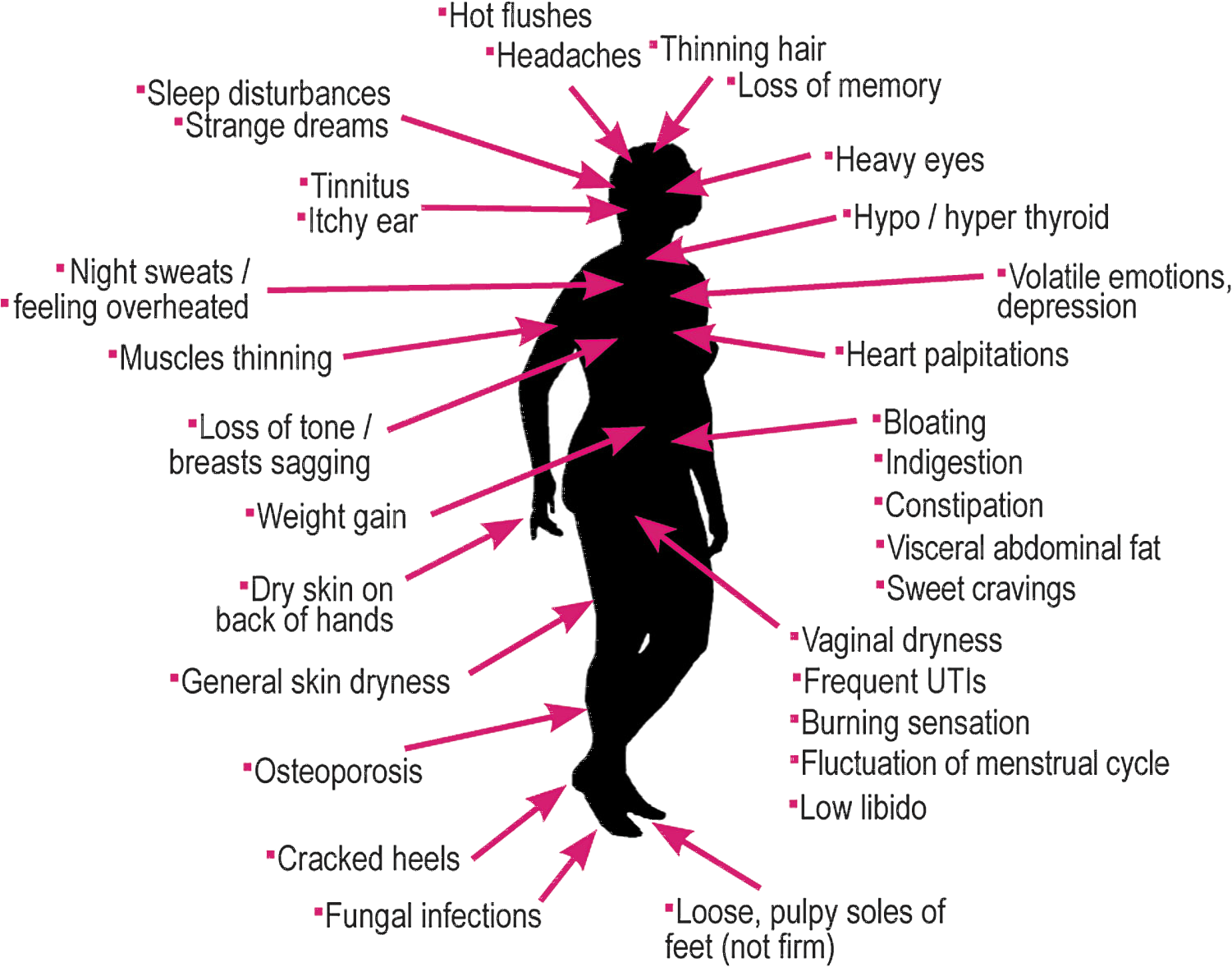As common symptoms of menopause take center stage, this comprehensive guide delves into the physical, emotional, and cognitive changes that accompany this transitional phase, providing a wealth of knowledge and practical advice to navigate this journey with grace and understanding.
Menopause, a natural stage in a woman’s life, brings about a myriad of symptoms that can impact daily routines and overall well-being. This guide explores the most prevalent symptoms, their causes, and effective management strategies, empowering women to embrace this transition with confidence and clarity.
Hot Flashes and Night Sweats

Hot flashes and night sweats are common symptoms of menopause, affecting up to 80% of women. They are characterized by a sudden feeling of intense heat that spreads over the body, often accompanied by sweating, flushed skin, and a rapid heartbeat.
These episodes can occur at any time of day or night, but they are particularly common during sleep, leading to disrupted sleep patterns and reduced sleep quality.
Causes and Triggers
Hot flashes and night sweats are caused by a decline in estrogen levels during menopause. Estrogen helps to regulate body temperature, and its decrease during menopause can lead to fluctuations in body temperature and the development of hot flashes.
Certain triggers can also make hot flashes and night sweats worse, including:
- Caffeine
- Alcohol
- Spicy foods
- Stress
- Smoking
Impact on Daily Life and Well-being
Hot flashes and night sweats can significantly impact daily life and overall well-being. They can cause:
- Embarrassment and anxiety
- Disrupted sleep and fatigue
- Difficulty concentrating
- Irritability and mood swings
- Reduced quality of life
Mood Changes and Irritability
During menopause, hormonal changes can significantly impact mood and emotional well-being. The decline in estrogen and progesterone levels affects the brain’s chemistry, leading to a range of mood changes.
Common Mood Changes
Menopause can trigger irritability, anxiety, and even depression. Irritability is a common symptom, characterized by increased sensitivity, frustration, and a short temper. Anxiety may manifest as nervousness, worry, or difficulty concentrating. Depression, though less common, can involve feelings of sadness, hopelessness, and loss of interest in activities.
Impact on Relationships and Well-being
Mood changes can have a significant impact on relationships and overall emotional well-being. Irritability and anxiety can strain relationships, as they can lead to misunderstandings and conflicts. Depression can isolate individuals and interfere with their ability to enjoy life. It is important to recognize these mood changes as a normal part of menopause and seek support from healthcare providers, family, or friends.
Sleep Disturbances
Menopause can significantly disrupt sleep patterns, leading to a range of sleep disturbances. These disturbances can have a profound impact on overall sleep quality and daytime functioning.
The most common sleep disturbances during menopause include:
- Insomnia:Difficulty falling or staying asleep, waking up frequently, or waking up too early and being unable to fall back asleep.
- Hot flashes and night sweats:These can disrupt sleep by causing sudden awakenings and feelings of discomfort.
- Restless legs syndrome (RLS):An uncomfortable sensation in the legs that worsens at night and can make it difficult to fall or stay asleep.
- Sleep apnea:A condition in which breathing repeatedly stops and starts during sleep, leading to frequent awakenings and poor sleep quality.
The causes of these sleep disturbances are complex and can vary from person to person. However, hormonal changes, particularly the decline in estrogen levels, play a significant role.
Estrogen has a calming effect on the body and helps regulate sleep. As estrogen levels decline during menopause, it can lead to sleep disturbances such as insomnia, hot flashes, and night sweats.
Other factors that can contribute to sleep disturbances during menopause include:
- Stress and anxiety
- Lifestyle changes
- Medications
- Medical conditions
Sleep disturbances during menopause can have a significant impact on overall health and well-being. They can lead to fatigue, irritability, difficulty concentrating, and decreased productivity.
Cognitive Changes
Menopause can bring about cognitive changes that affect memory, concentration, and attention. These changes can range from mild to severe and may impact daily activities and overall quality of life.
Memory
Memory changes during menopause can manifest in various ways. Short-term memory may be affected, making it harder to recall recent events or conversations. Difficulty concentrating and paying attention can also impact memory, as it becomes harder to encode and retrieve information.
Concentration and Attention
Menopause can lead to difficulty concentrating and paying attention. This can affect work performance, social interactions, and daily tasks. Distractions may become more noticeable, and it may take longer to complete tasks that require sustained attention.
Physical Symptoms
Menopause can bring about a range of physical symptoms, including joint pain, headaches, and weight gain. These symptoms can be caused by the hormonal changes that occur during menopause. <>The table below provides a summary of common physical symptoms of menopause, their causes, impact, and treatment options.
Table of Physical Symptoms, Common symptoms of menopause
| Symptom | Cause | Impact | Treatment Options ||—|—|—|—|| Joint pain | Decreased estrogen levels | Pain, stiffness, and reduced mobility | Exercise, pain relievers, physical therapy || Headaches | Fluctuating hormone levels | Pain, throbbing, and sensitivity to light and sound | Over-the-counter pain relievers, relaxation techniques, stress management || Weight gain | Reduced metabolism and hormonal changes | Increased body fat, particularly around the abdomen | Healthy diet, exercise, hormone replacement therapy || Hot flashes and night sweats | Fluctuating hormone levels | Sudden feeling of intense heat, sweating, and redness | Hormone replacement therapy, lifestyle changes, medications || Vaginal dryness | Decreased estrogen levels | Painful intercourse, vaginal itching and burning | Vaginal lubricants, hormone replacement therapy, laser therapy || Urinary incontinence | Weakened pelvic floor muscles | Leakage of urine during coughing, laughing, or sneezing | Pelvic floor exercises, lifestyle changes, surgery || Sleep disturbances | Fluctuating hormone levels, hot flashes, and night sweats | Difficulty falling or staying asleep, waking up frequently | Hormone replacement therapy, relaxation techniques, sleep hygiene || Cognitive changes | Reduced estrogen levels | Memory loss, difficulty concentrating, and mood swings | Hormone replacement therapy, brain-stimulating activities, lifestyle changes || Skin changes | Reduced collagen production | Dry, thin, and wrinkled skin | Moisturizers, sunscreen, hormone replacement therapy || Hair loss | Reduced estrogen levels | Thinning hair, hair loss | Minoxidil, hormone replacement therapy, lifestyle changes |
Emotional Symptoms

Menopause can trigger a range of emotional symptoms that can significantly impact daily life and well-being. These symptoms can manifest in various ways, from irritability and mood swings to anxiety and depression.
The hormonal fluctuations associated with menopause can disrupt neurotransmitter levels in the brain, leading to emotional instability. Additionally, the physical and psychological changes that accompany menopause, such as hot flashes, sleep disturbances, and cognitive changes, can further contribute to emotional distress.
Emotional Manifestations
- Irritability and mood swings:Rapid shifts in mood, from feeling happy and content to irritable and angry, can occur without apparent triggers.
- Anxiety and nervousness:A persistent feeling of unease, worry, and fear, often accompanied by physical symptoms such as racing heart, shortness of breath, and sweating.
- Depression:Persistent sadness, loss of interest in activities, and feelings of hopelessness and worthlessness.
- Emotional lability:Sudden and uncontrollable outbursts of emotions, such as crying or laughing, in response to seemingly minor triggers.
li> Emotional withdrawal:A desire to isolate oneself from social interactions and activities due to feeling overwhelmed or emotionally vulnerable.
These emotional symptoms can have a significant impact on relationships. Irritability and mood swings can strain relationships with partners, family, and friends. Anxiety and depression can lead to social withdrawal and isolation. Emotional lability can make it difficult to engage in social situations or maintain professional relationships.
Overall, the emotional symptoms of menopause can take a toll on a woman’s well-being, affecting her mood, relationships, and overall quality of life.
Lifestyle Modifications for Managing Symptoms: Common Symptoms Of Menopause

Menopausal symptoms can be managed through various lifestyle modifications that address the underlying hormonal changes and their impact on physical and emotional well-being. These modifications aim to improve overall health, reduce symptom severity, and enhance quality of life during this transition.
Table of Lifestyle Modifications
The following table Artikels specific lifestyle modifications that can be beneficial for managing menopausal symptoms:| Lifestyle Modification | Benefits | Considerations | Implementation Tips ||—|—|—|—|| Exercise | Reduces hot flashes, improves mood, promotes sleep, strengthens bones | Choose activities you enjoy and gradually increase intensity | Aim for at least 150 minutes of moderate-intensity exercise per week || Diet | Manages weight gain, reduces hot flashes, improves heart health | Focus on nutrient-rich foods, limit processed foods and sugary drinks | Include plenty of fruits, vegetables, whole grains, and lean protein || Stress Management | Reduces anxiety and irritability, improves sleep | Find healthy coping mechanisms, such as yoga, meditation, or spending time in nature | Practice relaxation techniques regularly and seek support from friends, family, or a therapist if needed || Sleep Hygiene | Improves sleep quality and reduces fatigue | Establish a regular sleep schedule, create a relaxing bedtime routine, and avoid caffeine and alcohol before bed | Ensure your bedroom is dark, quiet, and cool |By implementing these lifestyle modifications, women can effectively manage menopausal symptoms and improve their overall well-being during this transitional phase.
FAQs
What is the most common symptom of menopause?
Hot flashes and night sweats are the most commonly reported symptoms of menopause, affecting up to 85% of women.
How long do menopausal symptoms typically last?
The duration of menopausal symptoms varies widely, but most women experience symptoms for an average of 4 to 5 years. However, some women may experience symptoms for a shorter or longer period.
Can menopause cause weight gain?
Menopause can lead to weight gain due to hormonal changes and decreased metabolism. However, adopting a healthy diet and exercise routine can help manage weight gain during this transition.